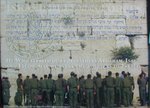Set Your Watch with B'nai Elim Jerusalem Time
Jerusalem On Line - Channel 2 News from Israel
UN Doomsday Treaty With Ginny Simone
22 February 2008
IRON DOME = TISSUE PAPER & LIES
Iron Dome system found to be helpless against Qassams
By Reuven Pedatzur,
Haaretz Correspondent
Last update - 03:19 22/02/2008
www.haaretz.com/hasen/spages/956859.html
Prime Minister Ehud Olmert was surprised to learn last Sunday that the Iron
Dome defense system, which was approved last year and was supposed to
protect Israel's citizens against Qassam rockets, is not capable of
alleviating the distress of Sderot inhabitants. "Recent tests found the
system to be effective against rockets fired from more than four kilometers
away, but not against those fired from closer range," Haaretz noted that
same day in its lead story. Because Sderot is less than two kilometers from
Beit Hanun, from which the rockets are being fired, Iron Dome will be
helpless against them.
The upshot is that the prime minister, who just two months ago declared that
"we will not fortify ourselves to death," was compelled to approve
recommendations to fortify 8,000 homes in Sderot and the communities of the
"Gaza envelope," to the tune of NIS 300 million. Such protection is
necessary because these homes lie within 4.5 kilometers of the Gaza Strip.
But a mere day later, it turned out that the plan was too ambitious and that
budget shortfalls meant that only 3,600 homes in Sderot and the Gaza
envelope can be fortified within the next two years. The solemn declarations
to fortify the homes, revoked only hours later, are just the latest chapter
in a gloomy saga replete with deception, lies, concealment of the truth from
policymakers, groundless promises to Sderot residents, the unexplained
rejection of the arguments for examining additional defense systems other
than Iron Dome, and bizarre decisions made in the Defense Ministry.
The decision to focus on the development of Iron Dome raises so many
questions that an examination of the process that led to it is in order. The
questions include, for example, whether the decision was influenced by
considerations relating to commercial bodies, the likely implications of a
deal to export this defense system to a foreign country which is not located
in the NATO continents (America and Europe), and the motives of some of
those involved in the process. It may well be that nothing concrete lurks
behind these questions, but we must not ignore the need to find satisfactory
answers for them.
The fact that Iron Dome is not effective against short-range rockets and
therefore cannot protect Sderot was long known to the system's developers
and to the Defense Ministry officials who chose to focus on it. For some
reason, they decided not to go public with their information. When the
Defense Ministry officials, led by the defense minister, promised that the
residents of Sderot would be protected after the installation of the Iron
Dome system, they knew they would not be able to deliver on this promise.
One need not be privy to classified information in order to understand that
Iron Dome is not the solution to the Qassam rockets. The data are public
knowledge: The Qassam's speed in the air is 200 meters per second. The
distance from the edge of Beit Hanun to the outskirts of Sderot is 1,800
meters. Therefore, a rocket launched from Beit Hanun takes about nine
seconds to hit Sderot. The developers of Iron Dome at Rafael Advance Defense
Systems know that the preparations to simply launch the intercept missiles
at their target take up to about 15 seconds (during which time the system
locates the target, determines the flight path and calculates the intercept
route). Obviously, then, the Qassam will slam into Sderot quite a number of
seconds before the missile meant to intercept it is even launched.
But besides not being able to protect the border communities, Iron Dome will
also not be able to cope with rockets that are launched much farther away.
According to data available from Rafael, the average flight time of the
intercept missile to the point of encounter is another 15 seconds. In other
words, to intercept a rocket using Iron Dome requires at least 30 seconds.
This is the time it takes a Qassam to cover six kilometers.
The disturbing question is why no one bothered to apprise the prime minister
of this simple calculation, to make it clear to him that Iron Dome, in the
development of which his government decided to invest hundreds of millions
of dollars, will not be able to protect Sderot. The questions multiply when
it emerges that on January 13 an urgent personal letter was sent to Defense
Minister Ehud Barak by the head of the Sha'ar Hanegev Regional Council, Alon
Schuster. He referred to the Qassam's short flight time, noted that the
reaction time of Iron Dome is too long to cope with the rockets, and added
that the system is incapable of protecting Sderot and many of the
communities bordering the Gaza Strip.
The reply of the Defense Ministry was sent to the council head on February
10. The letter is signed by attorney Ruth Bar, the defense minister's
assistant. "The analysis [done by the Defense Ministry] found that in regard
to the threats that were identified by the warning system during
April-November 2007, one Iron Dome battery has the ability to cope and cover
an area far larger than that of Sderot. The capability of Iron Dome to cope
with mortar shells has not yet been examined in depth. I will add that the
issue of the flight time cannot be detailed in this letter, owing to
security considerations."
The money issue
An examination of the economic aspect also casts grave doubts on the
decision to choose Iron Dome. The cost of each intercept missile will
probably be about $100,000. (Rafael claims the cost of a missile will be
about $40,000, but given the cost of similar missiles, that does not seem
reasonable.) In contrast, the cost of making a Qassam rocket is well under
$100,000. So, if the Palestinians produce thousands of Qassams, the Israeli
defense establishment will have to respond by manufacturing thousands of
Iron Dome missiles, at a prohibitive cost of hundreds of millions of
shekels. On the assumption that this information is known to everyone
involved, it must be asked, again, how it came about that Iron Dome was
chosen as the preferred solution to the Qassam rockets while other options
were vehemently rejected.
The decision was made, seemingly, via a proper, orderly procedure. The
Defense Ministry set up a professional committee to look into the matter,
headed by Yaakov Nagel, the deputy chief for scientific affairs of the
ministry's Directorate of Defense R&D. The committee examined 14 proposals
for anti-rocket defense systems and chose Iron Dome. Two defense ministers
approved the choice - Amir Peretz and Ehud Barak.
However, the impression of an orderly decision-making process is upended
when it turns out that the senior staff at the Defense Ministry's R&D
directorate strongly rejected the proposal to bring into Israel the
laser-based Nautilus defense system, whose development is nearly complete
and whose effectiveness was proved in a series of tests (100 percent success
in 46 tests, including success in intercepting mortar shells).
Nautilus was developed in the United States in conjunction with Israel, but
the Israeli defense establishment ended its participation in the project in
2001. The Americans went on with it, improved the system and changed its
name to Skyguard. Northrop Grumman, the company that is developing the
missile, promises that it can be delivered within 18 months at a relatively
low cost. The Nautilus system itself, devised to protect Kiryat Shmona
against Katyusha rockets, can be installed in Sderot within six months. By
comparison, the development of Iron Dome will take another three years.
The major advantage of Skyguard is its use of a laser beam for
interceptions. The beam travels at the speed of light, allowing the system
to intercept short-range rockets like the ones aimed at Sderot. The cost of
implementing the laser system is also far lower than Iron Dome. The cost of
launching one laser beam will be between $1,000 and $2,000. On February 6,
2007, Mike McVey, vice president of Northrop Grumman's Directed Energy
Systems business area, sent a letter to Ehud Olmert, with copies to the
defense minister at the time, Amir Peretz, and the then director general of
the Defense Ministry and present chief of staff, Gabi Ashkenazi, undertaking
to install in Israel an operational system within 18 months and at a fixed
price ($177 million for the first system). As far as is known, McVey has not
received a reply to this day.
Asked why Israel rejected the laser system, the Defense Ministry's spokesman
replied: "The Nautilus system is defined as exemplifying technologies and
not as an operational instrument. Bringing the Nautilus system into Israel
today will cost about $100 million, and it might take up to two years for
the system to become active. The Nautilus system is operationally inferior
to the Iron Dome system, is far more costly and does not provide an answer
to volleys of missiles, as Iron Dome is meant to do. Tests of Nautilus did
not achieve the goal of 100 percent hits but far less, and even that under
optimal conditions, which, regrettably, do not exist in the western Negev."
The reply is studded with inaccuracies, to say the least. The Nautilus /
Skyguard will not be "far more costly" than Iron Dome, but probably "far
less costly." Nor is it clear what the Defense Ministry spokesman is
referring to when he states that Nautilus "did not achieve the goal of 100
percent hits but far less." For his part, the IDF Spokesman, who was also
asked to comment on the decision not to acquire the laser system, copied the
reply of the Defense Ministry spokesman. Former air force commander Major
General (res.) David Ivry is one of those who favors adopting the laser
system, but the ministry's R&D directorate did not accept his position.
Another former air force commander, Major General (res.) Herzl Bodinger,
also tried to persuade the ministry to purchase the laser defense system,
again to no avail.
Buy blue-and-white
Part of the explanation for the opposition to the laser system may lie in
remarks made by Shimon Lavie, from the R&D directorate, who was the officer
of the Nautilus project in the United States, on the "Fact" TV program,
broadcast on Channel 2 last December. "We in the directorate are responsible
for developing blue-and-white [Israeli-made] systems, which the Nautilus was
not. We had hoped for intense cooperation with Israeli firms. If that had
happened, it might have had an influence [on the decision about whether to
acquire the laser system]."
Another question concerns the extent to which decision-makers were
influenced by an export deal with a foreign country not among those under
the jurisdiction and protection of NATO. Under the deal, said country was to
purchase the Iron Dome system and share in financing the project. Also worth
looking into is the influence exerted by MK Isaac Ben-Israel (Kadima), a
professor and retired major general, who was formerly head of the R&D
directorate, on the decision to choose Iron Dome. Until not long ago,
Ben-Israel was an enthusiastic advocate of the laser-based system,
explaining his position in detail in an interview with the newspaper Makor
Rishon in December 2006. "The limited range between the launch site and its
target allow a very short time for intercepting efforts," he said, and
stressed the high cost of rocket-based interception systems. "Those the
issues decide in favor of the laser weapon," he added. What made him change
his mind?
In a conversation this week, Ben-Israel denied that he had changed his mind
regarding the anti-rocket defense system. He says he continues to advocate
the laser-based defense, but believes that the technology by which the laser
beam is produced in Nautilus / Skyguard is obsolete. A little more than a
year ago, Ben-Israel still believed that the laser system was preferential
and efficient. It would be interesting to know what caused him to consider
this system obsolete not long afterward. When asked if he serves as an
adviser to the Singapore government, he said that being an MK does not allow
for it. When asked if he had served as an adviser to the Singapore
government in the past, he said: "I don't have to answer that question."
It is possible that some of the answers to these questions will be
forthcoming in court. This week, 50 Sderot residents petitioned the
Jerusalem District Court against the defense minister, requesting that the
court instruct the minister "to install and operate in the city of Sderot,
within six months from today, the laser-based intercept system (known as
Nautilus) to provide an immediate solution to the shelling of Sderot by
Qassams; to instruct the completion of the laser-based intercept system in
its full operational version, known as Skyguard, and to order deployment of
Skyguard systems for defense of all Western Negev settlements ... within two
years from today."
Sderot inhabitants continue to wait for fortification of their houses and
installment of a system that will stop the Qassam barrages. In the time that
has elapsed since the decision to develop Iron Dome, they could at least
have had their houses fortified. Will the public again require the help of
the court to figure out what is really going on in the corridors of the
Defense Ministry, because the policymakers, who are supposed to supervise it
and examine the peculiar decisions made there, are not doing their job?
*** Balanced Middle East News ***
MidEastweb http://www.mideastweb.org
Subscribe - mail to mewnews-subscribe@yahoogroups.com
Subscribe to:
Post Comments (Atom)
Colonel Richard Kemp, British Army - Comment on the IDF's Actions in Gaza
Radical Islams Plans for Western Civilization
THE THIRD JIHAD - WATCH THIS IMPORTANT FILM NOW - FREE
Obama's true agenda...Throw Israel Under the Bus
****Regarding Obama’s Speech before the U.N. Obama has surpassed the peanut farmer Jimmy Carter as the worst and most anti-Israel, anti-Semitic, Arabist President who has ever occupied the White House. Not only is he is a narcissistic moron who is dragging America into an abyss; Obama is the most dangerous threat to World Freedom, Liberty and Western Civilization since Hitler. (Blogmaster)
Senator Joe Leiberman 'Islamist Extremist Regime'
JOHN VOIGHT ON OBAMA'S DISTAIN FOR ISRAEL
CHAZAK CHAZAK
ON THE PATH TO MUSLIM DOMINATION - REVERSABLE? STOPPABLE?
2 STATE SOLUTION - COMMENTARY BY THE "18"
A message to the Jewish people and the entire world
Chronicles I - 16:15-18: "Forever remember His covenant that he commanded forever; That He made with Abraham and swore to Isaac; and confirmed in a decree for Jacob, for Israel, as an eternal covenant; saying to You I will give the Land of Cannan as your alloted heritage"
































 While doing IDF (Israel Defence Forces) reserve duty on a mountain overlooking the
While doing IDF (Israel Defence Forces) reserve duty on a mountain overlooking the 





No comments:
Post a Comment